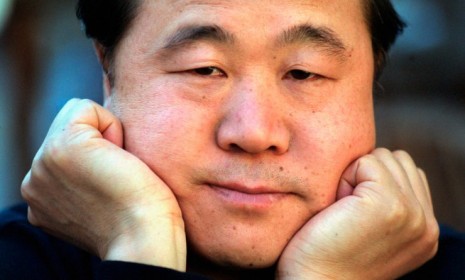Mo Yan: The life and career of 2012's Nobel-prize-winning author
The novelist is the first Chinese national ever to win the Nobel Prize for Literature — and his selection is fueling controversy

A free daily email with the biggest news stories of the day – and the best features from TheWeek.com
You are now subscribed
Your newsletter sign-up was successful
On Thursday, the Nobel Prize for Literature was awarded to Mo Yan, a Chinese writer whose breakthrough as an internationally acclaimed novelist began in 1987 with a book called Red Sorghum. Mo is the first Chinese national to win the prize (though Chinese emigre Gao Xingjian, who now resides in France, won in 2000). In a statement, the Nobel committee describes Mo as a writer "who with hallucinatory realism merges folk tales, history, and the contemporary." Here, a guide to the new Nobel laureate's life and work:
Who is Mo Yan?
The 57-year-old Chinese writer's career has spanned more than 30 years and dozens of books and short stories. Mo's early life was characterized by extreme poverty, says Sui-Lee Wee at Reuters; he was forced to drop out of school to earn money herding cattle, and "was sometimes so destitute he ate tree bark and weeds to survive." In his books, he "writes of visceral pleasures and existential quandaries and tends to create vivid, mouthy characters," says the Associated Press. His stories are typically set in China in the past, offering a mix of satire, literary experimentation, and raunchy humor that is commonly described as "Chinese magical realism."
The Week
Escape your echo chamber. Get the facts behind the news, plus analysis from multiple perspectives.

Sign up for The Week's Free Newsletters
From our morning news briefing to a weekly Good News Newsletter, get the best of The Week delivered directly to your inbox.
From our morning news briefing to a weekly Good News Newsletter, get the best of The Week delivered directly to your inbox.
Are his books available in English?
Most of them, including titles like Red Sorghum, The Garlic Ballads, and Big Breasts & Wide Hips, have been translated into English by Howard Goldblatt, and are widely available. Three of his works have also been adapted into films: 1987's Red Sorghum, 2000's Happy Times (based on the short story Shifu: You'll Do Anything For a Laugh) and 2003's Nuan (based on the short story The White Dog and the Swing).
Which of his books should I read first?
The Nobel Committee's permanent secretary, Peter Englund, recommends The Garlic Ballads as a "gateway book" for the rest of Mo's work, says The Guardian. The Garlic Ballads, which has been compared by western critics to Catch-22 and The Grapes of Wrath, is about a group of peasants ordered by the Chinese government to plant only garlic, only to be informed that the government won't buy their garlic due to a surplus. The book was originally banned in China, but is now widely available there.
A free daily email with the biggest news stories of the day – and the best features from TheWeek.com
Is any of his other work censored or banned?
Not anymore. Though Mo "is adamant that he never worries about censorship when choosing what to write," he also voluntarily "engages in the complex calculus of what is and isn't permissible" by the Chinese government, and works within those limitations, says Simon Elegant at TIME. In a recent interview at Granta, Mo said that he believes "limitations or censorship is great for literature creation" — an opinion which has proven to be controversial.
Why's that?
"I think for him to win the Nobel Prize for Literature is inappropriate," says human rights lawyer Teng Biao at Reuters. Mo's support for the Chinese regime, which included his participation in a project commemorating the 70th anniversary of a key speech by Mao Zedong, has led to criticism that he's not using his prominence as a writer to speak out for intellectuals or political prisoners. Perhaps sensing oncoming scorn, in the wake of his Nobel Prize win, Mo has refused all interviews.
Sources: The Associated Press, Granta, The Guardian, Reuters, TIME
-
 Why is the Trump administration talking about ‘Western civilization’?
Why is the Trump administration talking about ‘Western civilization’?Talking Points Rubio says Europe, US bonded by religion and ancestry
-
 Quentin Deranque: a student’s death energizes the French far right
Quentin Deranque: a student’s death energizes the French far rightIN THE SPOTLIGHT Reactions to the violent killing of an ultraconservative activist offer a glimpse at the culture wars roiling France ahead of next year’s elections.
-
 Secured vs. unsecured loans: how do they differ and which is better?
Secured vs. unsecured loans: how do they differ and which is better?the explainer They are distinguished by the level of risk and the inclusion of collateral